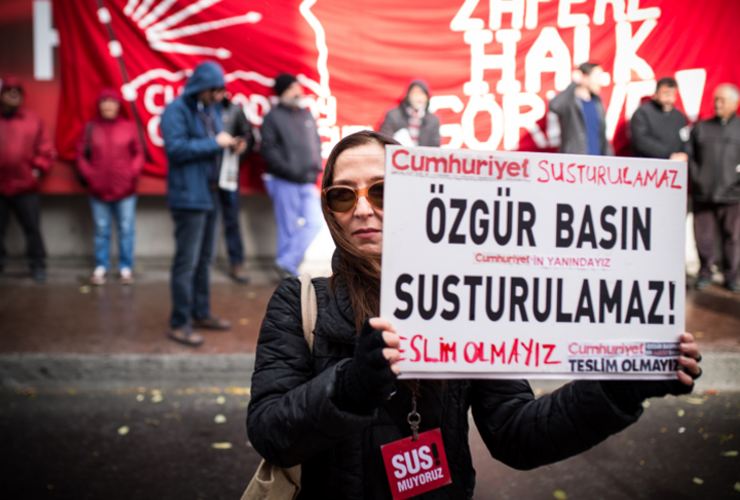Eight defendants in the trial against Turkey’s secular Cumhuriyet newspaper face an imminent return to prison after an appeals confirmation of their jail sentences was officially communicated to Turkey’s National Judicial Informatics System.
“After spending months in pre-trial detention and after being convicted in what was essentially a show trial, eight of the defendants in Turkey’s Cumhuriyet trial now stand to be deprived of their freedom again”, International Press Institute (IPI) Advocacy Director Ravi R. Prasad said. “This is not justice, but an arbitrary punishment for critical journalism. None of these journalists belong in prison. They must remain free and authorities must ensure that they can appeal their sentences further to the Supreme Court.”
What is the background?
In April 2018, 14 then-journalists and staff members with Cumhuriyet, including International Press Institute (IPI) Executive Board member Kadri Gürsel, were convicted on charges of lending support to multiple terror organizations of vastly different stripes: the Kurdish PKK, the extreme-left DHKP-C, and FETÖ, a government designation for the movement led by exiled cleric Fethullah Gülen, whom Turkey blames for the 2016 coup attempt.
However, despite seven hearings that in a case that lasted 17 months, prosecutors produced no actual evidence to support the charges, relying instead on news reports and social media posts, and on innocuous or unavoidable contacts – and even attempts at contact to which the accused did not respond – with individuals who had a secretive app on their phones said to have been used by Gülen’s followers.
Notably, proceedings in the case were plagued by egregious violations of the rule of law. Defendants were effectively punished without conviction, having been held for months in pre-trial detention with arbitrary limits on outside contact and interference with their right to mount a legal defence.
The defendants received prison terms ranging from two to eight years, while remaining free on appeal. All those convicted were handed a travel ban.
Why do only eight of the Cumhuriyet defendants face a return to prison?
In February, a regional appeals court in Istanbul upheld the sentences of all 14 defendants in the Cumhuriyet case, a decision IPI criticized as an “appalling violation of the rule of law”.
Whether the defendants have the right to now appeal the ruling further depends on the length of the sentence received. According to Turkish law, those with sentences of more than five years may still appeal to Turkey’s Supreme Court. Sentences of less than five years are considered final and are to be carried out. Eight defendants, including Gürsel, received such sentences.
Why is the return to prison now imminent?
After the appeals court ruling in late February, it was expected that the eight defendants with sentences of less than five years risked being sent back to prison in early March. However, further action in the case was delayed. This is believed to be due to a discussion on amending the law to admit a further appeal to the Supreme Court.
However, that discussion has not yielded a positive outcome. Last week, on April 18, the confirmed sentences of the eight defendants were uploaded to Turkey’s National Judicial Informatics System (UYAP), officially triggering the process of carrying out the sentences. The eight defendants have seven days to report to a police station and are then typically given a further seven days to surrender to a designated prison.
What about time served?
Most of the defendants in the Cumhuriyet case spent months in pre-trial detention. That time served should be subtracted from the sentenced handed down by the court in April 2018.
In addition, according to Turkish law, prisoners with less than one or two years on their sentence have the right to serve out the remainder on parole depending on the nature of the alleged crime. That rule should apply at least to Gürsel, who received a sentence of two years and six months but spend more than 11 months in pre-trial detention.
IPI Executive Board Chair Markus Spillmann travelled to Istanbul in March to show solidarity with the Cumhuriyet defendants and deliver a message of support to Gürsel from the other members of IPI’s Executive Board. The letter read:
“We believe now, as we believed then, that this sentence is a punishment for your brilliant journalism. We know that there was no evidence to support the charges against you. We know that you are guilty of no crime. We know that your rights to liberty and to freedom of expression have been grossly violated.”



